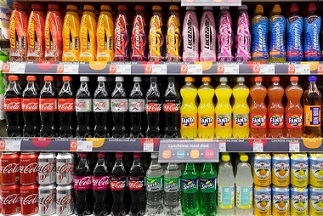U.S. Study Finds That Sugar-Sweetened Beverages Increases Risk For Various Lethal Cancers!
Source: Medical News - Cancer Sep 21, 2022 3 years, 3 months, 1 day, 1 hour, 57 minutes ago
A new study by researchers from the American Cancer Society-Georgia, the Albert Einstein College of Medicine-New York and Flatiron Health Inc-New York has found that sugar-sweetened beverages (SSBs) increases risk for various lethal cancers including colorectal and kidney cancers. At the same the study also found a concerning correlation between the consumption of artificially-sweetened beverages (ASBs) and pancreatic cancers that warranted further urgent studies.

According to the study team, sugar-sweetened beverage (SSB) consumption may be associated with cancer mortality independent of, or indirectly through, established influences on increased body adiposity.
The study team examined the associations of SSBs and artificially-sweetened beverages (ASB) with mortality from all-cancers combined, obesity-related cancers combined, and 20 cancer types, among men and women in the Cancer Prevention Study-II (CPS-II) prospective cohort. In 1982, 934,777 cancer-free participants provided information on usual SSB and ASB consumption. Deaths were identified through 2016. Multivariable Cox proportional hazards regression models examined associations of beverage types with cancer mortality, without and with BMI adjustment.
The study findings showed that during follow-up, 135,093 CPS-II participants died from cancer.
Consumption of ≥2 SSB drinks/day vs. never was not associated with all-cancer mortality, but was associated with increased risk of obesity-related cancers [HR, 1.05; 95% confidence intervals (CI), 1.01–1.08; Ptrend = 0.057], which became null after adjustment for BMI.
The study findings clearly indicated that the consumption of sugar-sweetened beverages (SSBs) was associated with increased mortality from colorectal (HR, 1.09; 95% CI, 1.02–1.17; Ptrend = 0.011), and kidney (HR, 1.17; 95% CI, 1.03–1.34; Ptrend = 0.056) cancers, which remained after BMI adjustment.
A positive association of ASB consumption with obesity-related cancers (HR, 1.05; 95% CI, 1.01–1.08; Ptrend = 0.001) was null after controlling for BMI; however, an increased risk of pancreatic cancer was robust to BMI adjustment (HR, 1.11; 95% CI, 1.02–1.20; Ptrend < 0.008).
The study team concluded that SSB consumption was associated with higher mortality from certain cancers, partially mediated through obesity.
They also warned that associations of ASB consumption and increased pancreatic cancer risk warranted further study.
The study findings were published in the peer reviewed journal: Cancer, Epidemiology, Biomarkers & Prevention.
https://aacrjournals.org/cebp/article-abstract/doi/10.1158/1055-9965.EPI-22-0392/709016/Sugar-and-Artificially-Sweetened-Beverages-and?redirectedFrom=fulltext
The new study findings offer yet another valid reason why people should cut back on their soda consumption or even other sweet beverages.
The U.S. CDC has already warned of the numerous health hazards of consuming s sugar-sweetened beverages.
https://www.cdc.gov/nutrition/data-statistics/sugar-sweetened-be
verages-intake.html
Lead study author Dr Marjorie McCullough, senior scientific director of epidemiology research at the American Cancer Society told Thailand
Medical News, "Unfortunately, many people especially Americans exceed recommended limits on sugar consumption by the U.S. Dietary Guidelines, and sugar-sweetened beverages are known risk factors for weight gain, being overweight and obesity."
The study findings also appear to be related to the higher body mass index (BMI) of the participants who regularly drank these sugar-sweetened beverages.
The study team utilized data from a cancer prevention research, searching for associations between these beverages and all cancers, obesity-related cancers and 20 cancer types.
The study team followed the participants from 1982, when more than 934,000 cancer-free individuals provided information on beverage consumption, until 2016.
Surprisingly, the study team found that over 135,000 participants had died from cancer by 2016.
Although drinking more than two sugar-sweetened beverages per day was not associated with all-cancer deaths compared to those who drank none of these beverages, it was associated with an increased risk of obesity-related cancers.
However, this was nullified after adjusting for BMI.
Alarmingly, the sugar-sweetened beverages were associated with increased death rates from colon and kidney cancer, which still held true after adjusting for BMI.
Worryingly, study participants who consumed artificially sweetened beverages also had an increased risk of pancreatic cancer, even after BMI adjustment.
Thailand
Medical News had covered a recent study that showed artificial sweeteners also caused glycemic response impairment via the gut microbiome involvement.
https://www.thailandmedical.news/news/ucla-study-shows-that-artificial-sweeteners-like-stevia,-saccharin-and-sucralose-causes-glycemic-response-impairment-via-gut-microbiome
Dr McCullough added, "Future research should consider the role of BMI in studies of sweetened beverages and cancer risk. These results should inform public policy regarding sweetened beverage consumption, to decrease the risk of cancer for men and women in the United States."
For the latest on Cancer, keep on logging to Thailand
Medical News or to our sister website,
www.thailandcancerhelp.com
